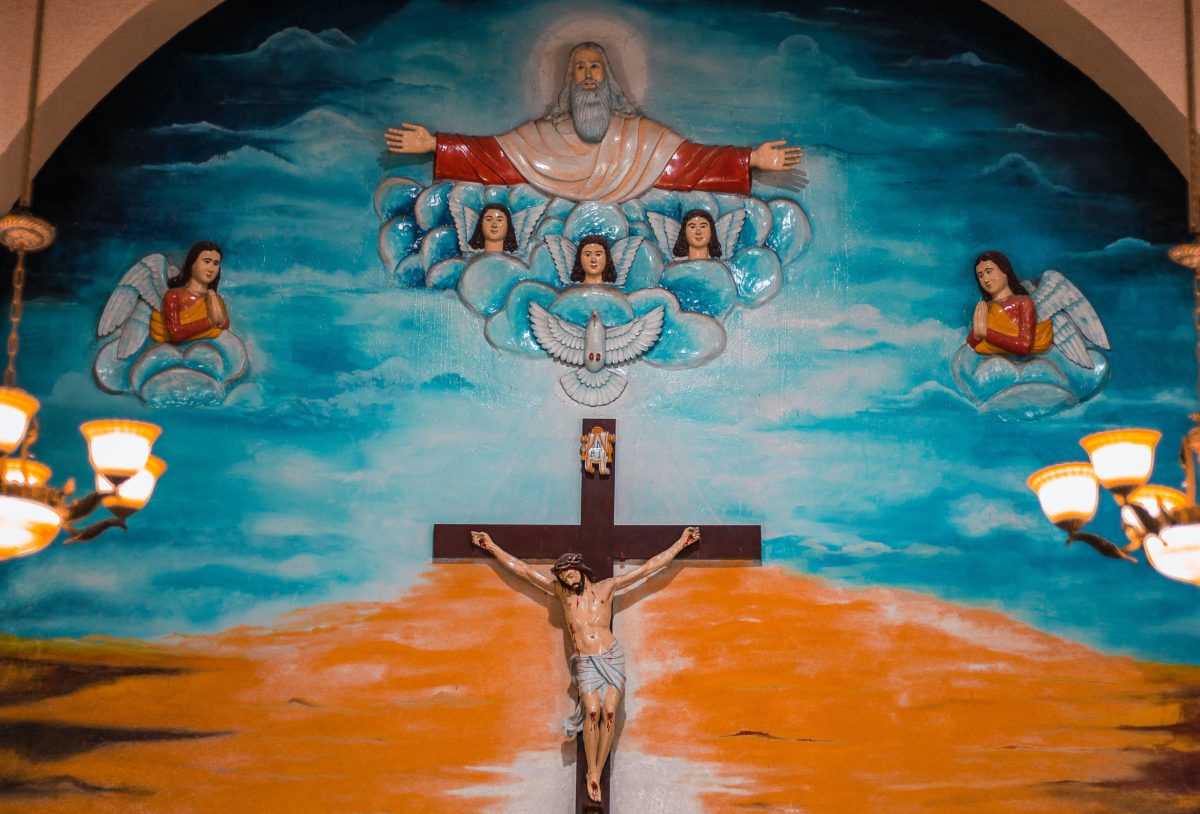Co-missioners,
Last Sunday was one of the more stressful days in the church year for preachers and hearers alike. The former felt pressed to explain the inexplicable. The latter yearned to be edified and squirmed when they weren’t. Teeth were grinding all around when the exercise was done—or so we imagine. Maybe next year a few more preachers might take some clues from Steve Kuhl. One hopes. One prays. See below for the way he handled the matter of the Holy Trinity last Sunday. And yes, be edified.
Peace and Joy,
The Crossings Community
The Sound of the Spirit: A Reflection on the Trinity
by Steven C. Kuhl

Text: John 3:1-17
This Sunday we celebrate Trinity Sunday. It is the one day in the church year where we commemorate a teaching or doctrine.
Still, the Trinity is much more than a doctrine. In truth, the Christian confession that God is "one God in three persons" was not arrived at by speculation on the nature of God, but from the historical event of salvation revealed in the coming of Jesus Christ. True, on the one hand, the trinitarian nature of God is a mystery beyond comprehension. But, still, on the other hand, it is also a description of historical facts that have been seen, heard and born witness to. The Trinity is precisely the description of the nature of God clearly revealed in what Jesus says and does.
Jesus says he is the Son of God who comes from God the Father. That's who he is. What he was sent to do was to take on our human nature and condition so that he could rescue us from that condition: sin and death. That he takes on our human condition of sin and death he does, as he says, by his suffering, death, and burial. That he actually rescues us from that condition, he does, as he says, by his resurrection from the dead and his ascension or return to the Father. Indeed, that the Father raised his incarnate and crucified Son, Jesus, from the death and receives him back to himself is the sure sign that what Jesus says about himself and God is true. His death and resurrection means that he is the Son of God sent by the Father to rescue us humans from sin and death. That, in a nutshell, is the gospel, the good news of Jesus Christ.
But, as Jesus also said, in order for God to take what he did and apply it to us (John 16:13) even more about God will be revealed. That more is God the Holy Spirit. Therefore, Jesus said, when he ascends or returns to the Father, they will send the Holy Spirit, the third person of the trinity, to be with us to strengthen us in faith and to support us in our ministry of proclaiming the gospel of Jesus Christ throughout the world, beginning in our own neighborhoods. This gift we also celebrated last Sunday as Pentecost Sunday.
But what is the proof that there is a Holy Spirit. This Sunday's Gospel (John 3:1-17) not only talks about the three persons of the trinity, but also tells how we know that there is a Holy Spirit. It, too, is very mysterious, but that does not mean its presence is not clearly experienced in history. In one important verse in today's Gospel reading Jesus explains to Nicodemus, how to identify the work of the Spirit in the world by using the analogy of the "wind," which is "pneuma" in Greek, from which we get the English word pneumatic.
 The Greek word "pneuma" is very flexible and, depending on context, can mean "spirit,” "wind” or “breath.” Here the verse does a wordplay on its double-meaning as spirit and wind. The verse says, "The wind (pneuma) blows where it wills, and we hear the sound of it, but we know not where it comes from or where it goes. So it is with everyone born of the Spirit (pneuma)" (3:8).
The Greek word "pneuma" is very flexible and, depending on context, can mean "spirit,” "wind” or “breath.” Here the verse does a wordplay on its double-meaning as spirit and wind. The verse says, "The wind (pneuma) blows where it wills, and we hear the sound of it, but we know not where it comes from or where it goes. So it is with everyone born of the Spirit (pneuma)" (3:8).
The presence of the Spirit is explained like this. Like the wind we cannot see the Spirit or control the Spirit. But also like the wind, we can know that it exists. Why? Because "we can hear the sound of it." And what is the sound of the Spirit? It is the “testimony” (3:11) heard in the world that "God (the Father) so loved the world that he gave his only begotten Son, so that whoever believes in him shall not perish but have everlasting life" (John 3:16).
That this message has not died out, but is heard throughout the world, is the proof, says Jesus, that the Holy Spirit exists. But even more, the fact that people like you and me believe this message is further proof that there is a Holy Spirit. For the Holy Spirit is the one whom the Father and the Son sent to make sure the gospel is proclaimed and that people, like you and me, not only believe it, but are moved by the Spirit to share it. So you see, by analogy, just as the sound of rustling leaves is proof that there is wind (pneuma) blowing, so the sound of us sharing the gospel is proof that the Holy Spirit (Hagias Pneuma) is working.
For more proof, come to Church. There, the sound you will hear is precisely that of the Holy Spirit proclaiming the gospel through the enactment of the liturgy: audible words and visible signs (sacraments) through which the sound of the good news (John 3:16) is proclaimed in many and various ways. Then, when you “go in peace (from Church) to love and serve the Lord,” listen for the sound the Spirit makes in the week to come. You may hear it from others as though they were rustling leaves or you may hear it in your own words and deeds as you "love one another as Christ loved you." But I guarantee you, you will hear it if you listen. For the Holy Spirit, like the wind, blows wherever it wills, proclaiming the love of the Father through the sacrifice of his Son. You can't stop it. True, you never know where it is coming from or where it is going. That is its mystery. But hear it you will. That is no mystery. So believe it!




You must be logged in to post a comment.